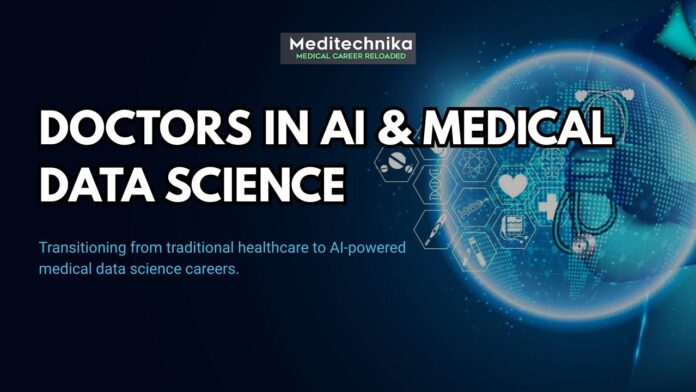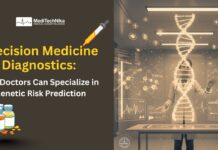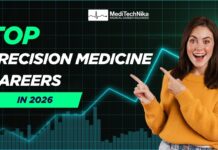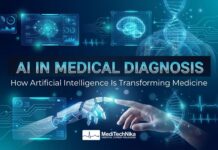Stethoscope To Spreadsheet: Doctors In AI & Medical Data Science
AI for Doctors: Medicine is now entering into digital world where every patient record, lab report, and clinical trial reveals new information about diagnosis, treatment, and global health trends. Artificial Intelligence (AI) and data science are now transforming the entire medical science field, and those who understand both medicine and data are going to lead it. For Allied Health graduates and doctors, this is not just an opportunity; it is a natural development for those who understand human biology, disease mechanisms, and patient outcomes better.
Hospitals, research organisations, and pharmaceutical companies are using AI to expand discoveries, where experts and specialists with a medical background have a unique chance to get into roles that combine compassion with computation. This article explores how healthcare professionals, like doctors and allied health graduates, can transition into AI & medical data science roles. Whether you are a fresh graduate or an expert, the roadmap ahead reveals how to build a career in healthcare data science jobs in India and abroad as well.
Why doctors should embrace data science:
Modern healthcare is completely dependent on data, from predicting disease outbreaks to personalized medicine with treatment plans. This data-driven information is transforming clinical decision-making, especially for doctors, with their diagnostic reasoning and evidence-based approaches.
Data scientists are not from a medical background, so doctors having a medical degree bring a clear understanding of how clinical research works. Also, the doctors who have mastered the AI and data science tools can bring clinical insights and analytical thinking together, which increases the accuracy of interpretation. This does not mean that data science is overtaking medicine, but it creates an impact on the future physician who may not just diagnose but will also analyze the data and help design AI tools that can help to improve patient care globally.
Understanding Clinical Data Management (CDM):
If you are new to this term, Clinical Data Management (CDM) is the process of collecting, cleaning, and validating clinical trial data to ensure accuracy before it reaches researchers and regulators. And for professionals who want to explore a clinical data management career, it offers a perfect transition. As doctors already know the medical terminologies, disease codes, and disease mechanisms with patterns, this integration can make it more efficient.
As AI tools are involved in routine validation tasks, CDM roles are expanding towards data analytics and visualization. Medical graduates who start their career in CDM can later move into strategic roles that involve data interpretation and optimization.
AI for Doctors: EDC Tools & Medidata Rave in Healthcare Data:
The transition from paper-based data collection to digital platforms created a huge impact on research. Electronic Data Capture (EDC) systems—such as Medidata Rave are now central to modern trials.
Medidata Rave helps us to track the data in real-time by reducing errors and improving transparency. Experts trained in EDC tools, especially Medidata Rave healthcare systems, can monitor and manage global clinical data more effectively.
Mastering EDC tools can be an advantage for doctors and health graduates because it increases their credibility and employability globally, where recruiters can understand that you know both medical content and digital systems, which is essential for clinical data careers and regulatory research roles.
Learning the Language of Data—SAS & Analytical Tools:
Once you master how clinical data flows, the next step is learning to analyze it. SAS training for healthcare data jobs is one of the most demanding skills to master and is worth investing in for anyone who is entering this field. SAS is used in the entire world for statistical analysis, pharmacovigilance reporting, and regulatory submissions.
Doctors who mastered the SAS skill can translate clinical knowledge into data-driven insights, where they can analyze patient responses, treatment comparisons, and create models that can predict and support decision-making in real time.
Along with SAS, tools such as R, Python, and SQL increase the chance of versatility. In India and abroad, employers prioritize individuals who can combine medical knowledge with technical proficiency. It is a key skill for success in healthcare data science jobs in India.
Career Pathways: From CDM to Data Scientist:
Many doctors & allied graduates start their careers with CDM jobs for medical graduates, since they gain practical experience in data collection and quality control from here, the opportunities broaden into clinical data analyst, data scientist, or bioinformatician roles.
One who continues to upgrade themselves with certifications and analytical training often tends to get into leadership positions such as clinical data lead or healthcare AI specialist.
The career path from clinical data management careers to senior-level data science positions can be built based on three main pillars:
- Clinical understanding
- Statistical reasoning
- Technology adoption
Exploring Clinical Trials Data Careers:
Behind every approved medical device or drug, experts are managing the data. Clinical trials data careers involve data monitoring, data validation, and data analysis that ensure that the research findings are accurate with regulatory standards.
It is very important to ensure the patient’s safety and the real-world impact of data findings. Doctors play a crucial role in analyzing these trial results. Now the AI is integrated into the trial monitoring, making the job easy. Experts skilled in EDC tools, Medidata Rave healthcare systems, and SAS tools for healthcare data jobs will create a huge impact by modernizing global research.
This is the field where medical knowledge meets innovation that can directly contribute to advancing medical science.
Opportunities in Healthcare Data Science Jobs in India:
India is fast-emerging as a global center for healthcare analytics and AI innovation. From MNC pharma companies to digital healthcare startups, the demand for skilled individuals in healthcare data science jobs in India is growing very fast.
And for CDM jobs for medical graduates, India offers rapid career growth and global exposure for those who acquire technical skills and convert medical insights to interpret complex datasets.
How to Get Started: A Step-by-Step Transition Plan:
- Identify Your Domain Interest: This is the primary step to make the transition into AI & medical data science. You have to decide whether your passion lies in hospital analytics, AI-driven diagnosis, or clinical trials.
- Build Core Data Skills: One must master the basics of statistics, data visualization, and programming languages like R or Python.
- Invest in SAS Training: Invest time in SAS training for healthcare data jobs to reach recruiters and research organizations.
- Learn EDC Platforms: Gain hands-on experience with EDC tools, Medidata Rave Healthcare systems, which gives you a major competitive edge.
- Start with CDM Role: Apply for entry-level CDM jobs for medical graduates or apply for internships in CROs and pharma companies.
- Stay Connected: Join LinkedIn platforms, attend workshops, and follow skilled professionals or leading experts in the healthcare data science field.
- Expand into AI and Machine Learning: Explore healthcare AI applications like image analysis or predictive modeling, along with data handling.
Each step from the above helps you to build a career in AI & medical data science—moving from clinical knowledge to technical expertise and ultimately to leadership roles in the digital healthcare platforms.
Healthcare is no longer confined to hospitals and laboratories. The next generation of medical discoveries won’t just treat patients; they will decode the patterns hidden in data to prevent diseases before they begin.
For doctors and allied health professionals, entering into this world means evolving with the science as they have always expected. The future of medicine belongs to those who can merge empathy with analytics and use both to heal smarter, faster, and better.






